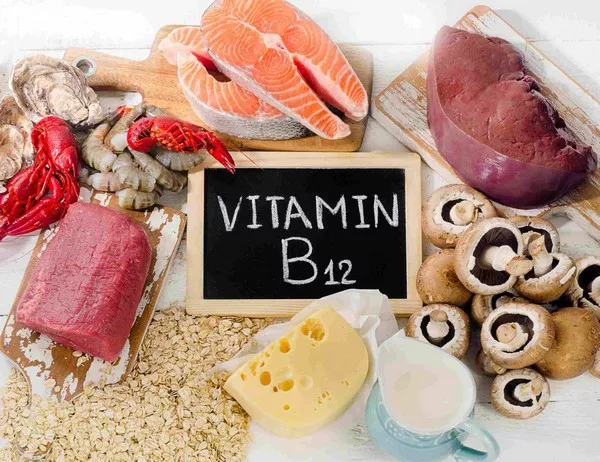Vitamin B12, also known as cobalamin, is a vital nutrient that plays a crucial role in various bodily functions, including the formation of red blood cells, proper neurological function, and the synthesis of DNA. While vitamin B12 is primarily found in animal-based foods, it’s essential for both vegetarians and omnivores to be aware of dietary sources of this nutrient. In this comprehensive guide, we will explore a wide range of foods that are rich in vitamin B12, ensuring that you have the knowledge to maintain optimal health and well-being.
The Importance of Vitamin B12
Before diving into the foods that contain vitamin B12, it’s essential to understand the significance of this nutrient in maintaining overall health:
Red Blood Cell Production: Vitamin B12 is crucial for the formation of red blood cells. A deficiency can lead to a type of anemia called megaloblastic anemia, which results in fatigue and weakness.
Neurological Health: B12 is essential for maintaining healthy nerves and preventing neurological issues such as nerve damage and cognitive decline.
DNA Synthesis: Cobalamin is involved in DNA synthesis and regulation. This function is critical for the growth and repair of all cells in the body.
Energy Production: B12 plays a role in converting food into energy, making it an essential nutrient for maintaining vitality and stamina.
Now, let’s explore various foods that are rich sources of vitamin B12:
Animal-Based Foods
a. Meat: Animal meats are some of the richest sources of vitamin B12. Beef, pork, lamb, and poultry all contain substantial amounts of this nutrient. A 3-ounce (85-gram) serving of cooked beef, for example, provides approximately 2.5 micrograms of vitamin B12, which is over 100% of the recommended daily intake for most adults.
b. Fish: Fatty fish, such as salmon, trout, and mackerel, are excellent sources of B12. A 3-ounce (85-gram) serving of cooked salmon contains around 4.9 micrograms of vitamin B12. Additionally, canned tuna and sardines are good options for those seeking to boost their B12 intake.
c. Shellfish: Shellfish like clams, mussels, and oysters are among the most concentrated sources of vitamin B12. A 3-ounce (85-gram) serving of cooked clams provides an astounding 84 micrograms of vitamin B12.
d. Eggs: Eggs are a reliable source of B12, with one large egg containing approximately 0.6 micrograms of the nutrient.
Dairy Products
a. Milk: Dairy products, including milk, are good sources of vitamin B12. One cup of cow’s milk typically contains around 1.2 micrograms of B12.
b. Cheese: Cheese varieties like Swiss, mozzarella, and cheddar contain moderate amounts of vitamin B12. A 1-ounce (28-gram) serving of Swiss cheese, for instance, provides about 0.9 micrograms of B12.
c. Yogurt: Yogurt is another dairy option that contributes to your B12 intake. A 6-ounce (170-gram) serving of plain yogurt contains roughly 1.4 micrograms of the vitamin.
Fortified Foods
a. Breakfast Cereals: Many breakfast cereals are fortified with vitamin B12, making them a convenient source of the nutrient for vegetarians and vegans. Check the labels to find out the exact amount of B12 added to a specific cereal.
b. Plant-Based Milk: Non-dairy milk alternatives, such as almond milk, soy milk, and rice milk, are often fortified with B12. Fortification levels can vary, so it’s important to check the product’s label for the exact amount of B12 provided.
c. Nutritional Yeast: Nutritional yeast is a popular seasoning among vegans and vegetarians due to its cheesy flavor and high B12 content. Just one tablespoon of nutritional yeast typically contains around 2.4 micrograms of B12.
Organ Meats
Liver: Organ meats, particularly beef liver, are incredibly rich in vitamin B12. A 3-ounce (85-gram) serving of cooked beef liver contains a whopping 70 micrograms of B12, well beyond the daily recommended intake.
Supplements
Vitamin B12 Supplements: In cases where it’s challenging to obtain sufficient B12 from dietary sources, supplements are a reliable option. They come in various forms, including capsules, tablets, and even sublingual (under the tongue) options. Consult with a healthcare professional to determine the right dosage for your specific needs.
Conclusion
Vitamin B12 is a vital nutrient that plays a fundamental role in maintaining overall health. While it is primarily found in animal-based foods, there are various dietary sources and supplements available for individuals with different dietary preferences. It’s essential to ensure you get an adequate intake of vitamin B12 to prevent deficiencies that can lead to anemia, neurological issues, and fatigue.
Whether you are an omnivore, vegetarian, or vegan, there are ways to incorporate vitamin B12-rich foods into your diet. By making informed choices and monitoring your intake, you can enjoy the benefits of this essential nutrient and support your long-termwell-being. Remember, it’s always a good idea to consult with a healthcare professional or registered dietitian to determine the best approach for meeting your specific vitamin B12 needs.


